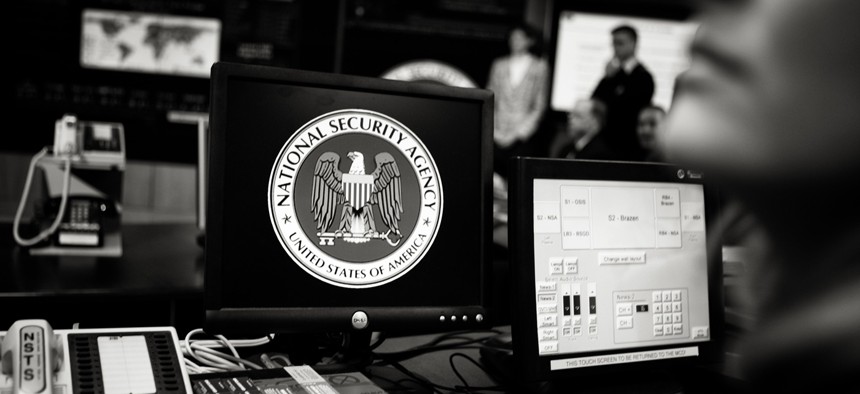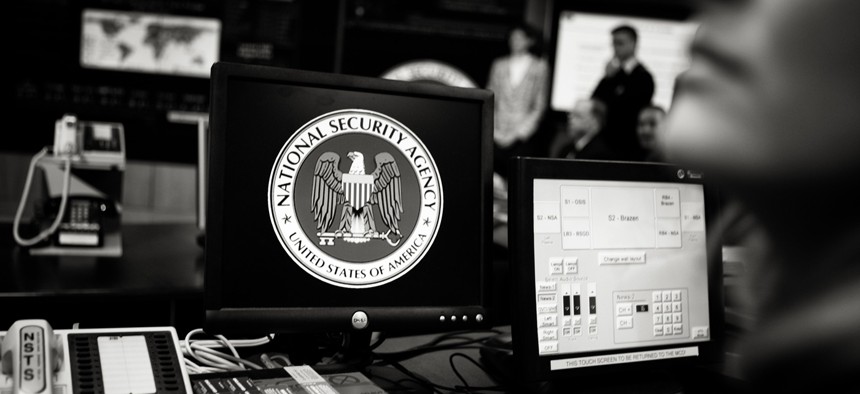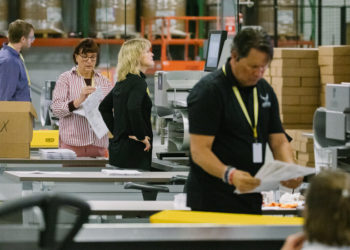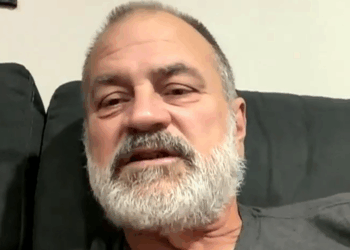
A combination of strains are threatening morale and even long-term capabilities at the National Security Agency, former U.S. national security officials and others with knowledge of changes there told Nextgov/FCW. Among them are leadership gaps, program cuts, buyouts, and the government shutdown that has furloughed workers.
The Pentagon’s top signals-intelligence agency has been without a permanent leader since Gen. Timothy Haugh was unexpectedly fired in April, and the White House recently backed down on its plans to elevate Lt. Gen. William Hartman, who has led the NSA and U.S. Cyber Command in an acting capacity ever since, said a person with knowledge of the matter. The reversal was first reported by The Record, the news unit of cybersecurity firm Recorded Future.
The NSA’s top lawyer, April Falcon Doss, was also let go on the advice of right-wing activist Laura Loomer, and other leading officials have chosen to leave the agency and the combatant command. A search to find candidates for various leadership positions at the agency continues, The Record reported last week.
“The morale inside the organization is rather depressed. It’s been depressed for a series of months at this point. That’s what happens when your boss disappears, and then some of your lead unicorns also disappear,” said a person familiar with the agency’s disposition, referring to uniquely talented leaders within the agency.
That person, as well as most sources for this story, requested anonymity because they were not authorized to publicly share their knowledge and perspectives on the internal posture of a major U.S. intelligence unit.
The sprawling spy agency has employs hacking, codebreaking, and eavesdropping capabilities to gather intelligence on adversaries around the world. It’s often dubbed a combat support agency that has legal authorities to intercept foreign communications deemed valuable to U.S. interests. The agency’s collections contribute to the president’s daily security briefings.
“NSA is one of our country’s most important lines of defense, and it depends on a strong, steady leadership team and a workforce that can focus on mission without fear of political interference,” Senate Intelligence Committee Vice Chairman Mark Warner, D-Va., told Nextgov/FCW in an email.
“Unfortunately, this administration’s pattern of firing seasoned intelligence leaders, leaving critical leadership posts vacant and publicly disparaging the intelligence community sends exactly the wrong message to those serving in silence to keep our nation safe,” added Warner. “That kind of instability is not just bad for morale, it’s bad for national security.”
Nextgov/FCW has reached out to the NSA and the Defense Department requesting comment.
Long-term capabilities
Agency staff deemed non-essential have been furloughed during the shutdown. One person with knowledge of NSA work said that although the shutdown hasn’t much affected the agency’s short-term capabilities, long-term planning is degrading, putting many analysts into a “reactive mode.”
That person could not add more details, but the NSA possesses a suite of pristine hacking tools, and is constantly storing or developing new exploits to breach targets’ systems.
As the shutdown persists, routine spying activities conducted by NSA and other DOD elements are continuing, but some forward-looking planning has been halted, according to a public Pentagon document that dictates shutdown plans. Paused longer-term activities include political and economic analysis work unrelated to current crises and intelligence support for weapons acquisition, though it’s not clear how much of that work directly falls on NSA analysts’ desks.
But NSA staff and people working in numerous other intelligence agencies have also been extended offers to leave federal service early, and NSA has set goals to shed some 2,000 civilian workers by the end of the year.
The combination of deferred resignations and furloughs has left unclear how many of the agency’s core specialists remain to shoulder its hacking and codebreaking missions.
As part of their day-to-day work, some agency analysts may be cultivating long-term relationships on dark web forums, fusing together a mix of human intelligence and computer-access skills that require months of frequent attention and communications with targets of interest, one former senior official said.
“It’s not as easy as in the movies where they say, ‘Get me on so-and-so’s system ASAP’ and then you just break into it,” said the ex-official. “You have to have that person on your radar … and you have to be in the right place at the right time to understand when that bad guy screws up so you can exploit that to conduct a cyber operation against them.”
If those analysts are away from their workstations because they’ve been deemed non-essential, or have left their roles altogether, those access opportunities ebb.
“In order to have more of those opportunities available, you really need to have undercovers and sources established ahead of time, and as those wind down, you lose the ability to start.” that former official said.
A diminished workforce also creates a perilous trickle-down effect on other units of the U.S. military. The dual-hatted nature of NSA and Cyber Command means that civilian analysts are constantly developing hacking toolkits and other capabilities alongside DOD cyber warriors, another former intelligence official said. If Pentagon cyber operatives are deployed overseas and face any technical difficulties, they could have trouble remediating them.
That concern, this former intelligence official said, especially applies to hunt forward operations, where U.S. cyber warriors from the Cyber National Mission Force physically deploy to allied host nations to observe and detect malicious cyber activity on their networks.
“We very likely have teams that are deployed right now. Those hunt forward teams are reliant on supporting elements from their home service right now,” they said. “If you’ve got a team deployed in Ukraine, they’re calling back to their home service if their kit doesn’t work, or if there’s some issue and they need to troubleshoot … and they also provide that on-call support for anything that goes wrong. Well, right now, those teams are depleted.”
Hunt forward missions helped the U.S. uncover Chinese malware activity in Latin American nations, Joint Chiefs Chairman Gen. Dan Caine told Congress earlier this year. While still in service, Haugh told Congress that hunt forward missions were deployed 22 times to 17 countries in 2023.
“[NSA] is a highly functional federal agency, and therefore it needs its people. It has its technology, it has its policies and processes,” said Mark Montgomery, a former Navy rear admiral who is now senior director of the Center on Cyber and Technology Innovation at the Foundation for Defense of Democracies, a national security think tank in Washington.
“Other federal agencies can gain and lose people, and you may or may not see the change in output,” he said. That doesn’t apply to NSA, which “relies on and benefits from an extremely purpose-built workforce, and so any perturbations will have an impact,” Montgomery added. “Morale is probably damaged by everything that’s happened over the last eight months,” he said, though it’s not necessarily “unrecoverable.”
The degree of turnover observed within the agency makes it difficult to adapt and evolve, especially for mid-level agency leadership, another person familiar with changes in NSA said. “The intelligence community needs to be taking risks,” said the person. “What keeps people working is a sense of mission. But when you get to higher-ups, the turnover makes them feel like they don’t have the ability or the buy-in to innovate.”
Attorney recruitment
There are also legal policy implications for the signals intelligence titan. This year, the NSA has paused recruiting young attorneys fresh out of law schools for its Legal Honors Program, according to another former senior national security official and the former intelligence official.
That has a “pronounced effect” with long-term implications, one of them said. “You certainly want those kinds of people there, because the kind of problems … NSA is facing are cutting-edge legal problems.”
Much of the NSA’s mission sits where intelligence work and privacy concerns meet. Its lawyers regularly prepare filings for the secretive Foreign Intelligence Surveillance Court, using precise legal and technical language to request permission to monitor and collect communications tied to specific targets.
There’s a ripple effect within law schools too, the former official added. “It affects the second- and first-year law students who think, ‘I’m not going to even apply to that, because I heard some third-year guys got turned down.’ Even if you reinstate the program, it’ll take two, three, four or even five years to rebuild.”
A similar dynamic has played out among recipients of the CyberCorps scholarship on college campuses, which for years has placed talented students into government cybersecurity roles.
One major open question is how NSA staff affected by deferred resignation offers are handling their transition out of government. The Trump administration has made it a point to say that, in initiating sweeping cuts to the federal enterprise, they would want more people in private sector jobs.
But when affected staff are unexpectedly forced to look for jobs in industry, they’ve found the market is too saturated, and that their pristine, tailored skill sets built up inside Fort Meade don’t align directly with industry demands.
“As an employee of those agencies, you are told you are the cream of the crop,” said the person who spoke about the depressed morale in the agency. “You’re told that you’re the best of the best, that you work in the most exquisite intel agency on the planet, that you are awesome.”
The person, recounting a recent retirement event for one senior officer who left NSA, put it bluntly: “They’re struggling to find work, and it was very depressing to be there.”
The post At NSA, a leadership vacuum and staff cuts threaten operations and morale appeared first on Defense One.




